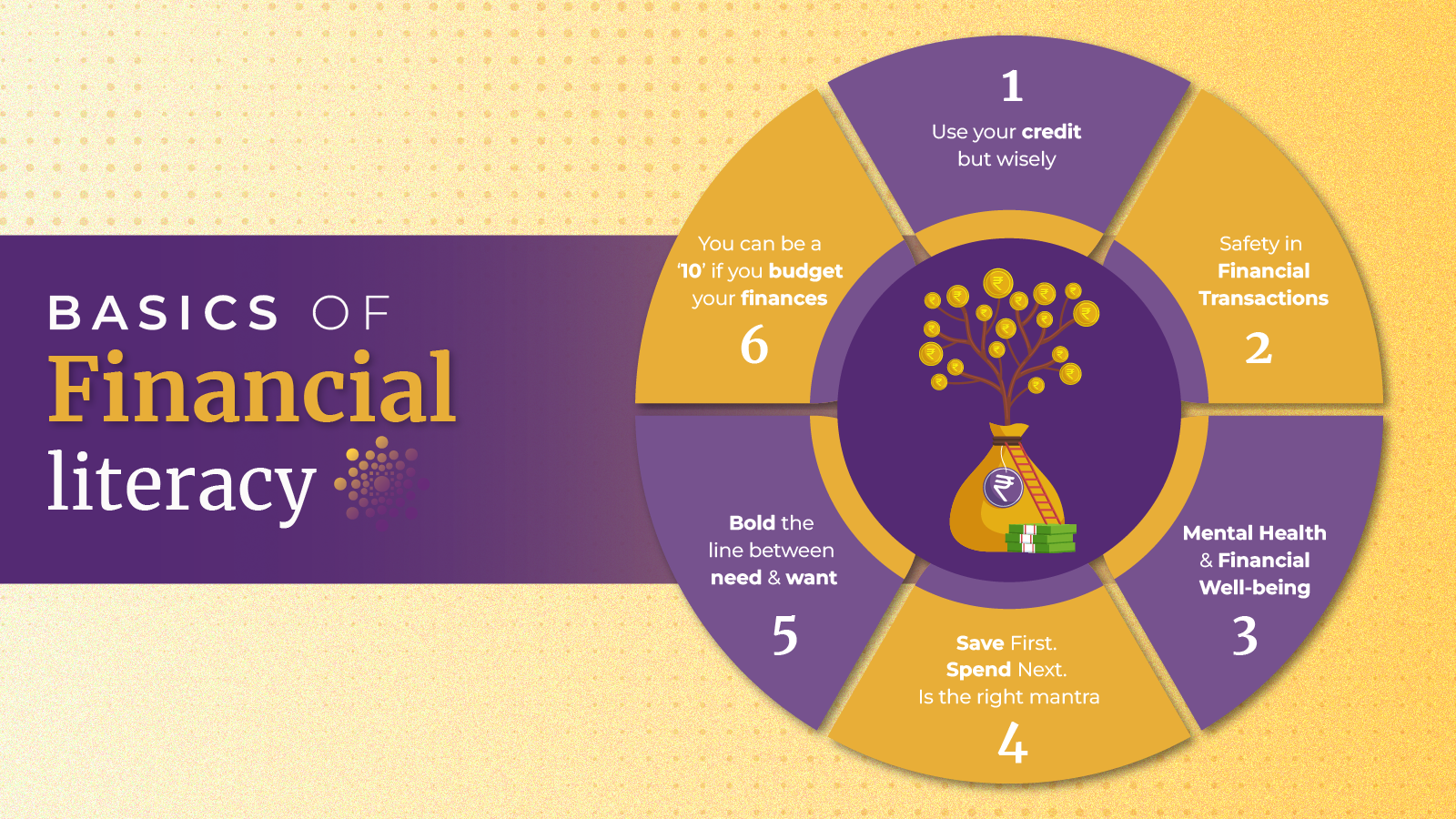
+91 80 41281 383 • Srinivasam, No. 20, 9th Cross, 6th Main, Malleshwaram, Bengaluru

Imagine this: you're a kid again, and your parents hit you with the classic line, "Money doesn't grow on trees." You roll your eyes, secretly wishing that it did. Fast forward to adulthood, and you realize that money indeed doesn't sprout from the branches like magic beans. Nope, it requires something far more valuable: your time and effort. The hustle and everything one puts on the line to increase their income and earn those 6 figures. But do you really know how to increase your wealth?
Growing wealth requires you to make informed decisions and the only secret sauce to increasing wealth is being financially literate. Financial literacy is not a modern-day concept but a modern-day requirement. To keep up with growing inflation and expenses, it is necessary to grow your money at the same pace. This is likely possible when you start believing in financial education.
According to a survey cited in the National Centre for Education in 2019, above 75% of Indian students lacked a basic understanding of financial concepts and 80% of women were financially illiterate. Given the Indian dynamics, the concept of money differs from person to person. Lack of financial knowledge creates an imbalance in the financial ecosystem. Hence, financial literacy is paramount.
So join us on this journey to financial freedom, one step at a time. Here are some important topics to understand your finances better.

‘I want to own a penthouse in New York City’ or ‘I want to travel the world by the age of 50’. Take a close look at these sentences. There is a clear indication of want that has something to do with the future or your aspirations and not your needs.
When considering financial goals, it's crucial to distinguish between needs and wants. Needs typically pertain to immediate necessities or requirements for sustaining oneself in the present or near future. For instance, ensuring there's enough money for rent, groceries, healthcare, and other essentials falls under addressing needs.
When you set your financial goals, generally, you consider the needs but there is a certainty that we place the ‘borderline expensive’ want in your daily budgeting. In financial planning, while needs take precedence for ensuring stability and security, there's also room to accommodate certain wants within budgeting frameworks. These borderline expensive 'desires', though not necessities, play a significant role in shaping personal aspirations and can serve as motivating factors for disciplined saving and investing.
Creating and maintaining a budget is one of the most basic parameters when it comes to financial literacy. In this digitized era, it is easier to create a budget with the help of apps on the smartphone.
Apps and online tools are transforming how we manage finances. You can utilize budgeting apps or services offered by many banking portals to track expenses effortlessly. You can set your monthly budget across various categories, and get to know the spheres where you are overspending. Monitoring your expenses allows you to have a fair idea of your monthly savings and gives insights into how you can increase your savings by tracking your spending.
Has your monthly expenses taken you by storm and all your efforts to save more money go in vain? Then, maybe it’s time to relook at your approach to saving money.
You might follow the standard approach to calculate your savings and it’s not reaping great results. In these cases, you can reverse your savings strategy and observe the results. For example, the basic tendency of human to calculate their savings is by subtracting income from expenses. But psychologically speaking, you can rewire your habit and calculate your expenses based on savings.
For example, if you earn 50k per month and looking to save about 15k per month, then to calculate your expenses, you need to budget your expenses from 35k (50k-15k). This approach allows you to think proactively about increasing your savings and budget your expenses.
A good savings habit reflects good financial health. But, most people don’t prioritize this aspect as much as they should.

We also tend to forget the benefits like compounding which come along with the early savings. Learning to save early in your working life can help you gain more wealth and achieve your goals well in time. And one must start early so that the savings habit becomes second nature to you.
Let’s go shopping. Swiped and done. What about a movie? Done. Credit card swiped. Ohh, this vicious and unceasing circle of credit card usage. Many experts suggest that the increase in discretionary spending on vacation, travel, entertainment and consumer durables in metros and beyond have surged the demand for credit card.
Using credit could be extremely useful if managed and repaid correctly. Sometimes, people get carried away and start using credit much more than they can pay off. This is the perfect example of being in a debt trap, where you may use multiple credit cards or utilise the BNPL service from different aggregators. Ultimately they end up paying a very high rate of interest on the loan taken.
Making careless decisions when you’re young can end up costing you throughout adulthood so it’s important to grasp the concepts and learn the responsible credit practices as early as possible. For example, millions grapple with student loan debt. Explore income-driven repayment plans, consider loan consolidation and prioritize debt repayment alongside saving goals.
Theft identification has become more important than ever. Since everything is digital and just about everyone has shopped online at one point or another, our financial information is more vulnerable to fraud. The evolving AI landscape adds another layer of concern, with data breaches potentially exposing financial details. Be mindful of online scams, breaches, phishing emails and suspicious websites, and stay informed about emerging fraud tactics. Use strong passwords, enable two-factor authentication, and avoid sharing sensitive financial information on unverified platforms. By adopting these precautionary measures, you can enjoy the benefits of a digital financial world while safeguarding your hard-earned money.
Money stress is real, by taking action you can achieve your financial goals instead of ignoring them which impacts your physical and mental well-being. It’s okay to take a break and meet with mental health professionals for financial therapy which can help you develop healthy financial habits as well as make informed decisions. Spending your time wisely by doing meditation or exercises in nature is also a helpful way to manage stress. Financial success is achieved by building a solid foundation and the first step to do that is by prioritizing your mental health.
The knowledge and confidence you develop to make informed decisions about your money is the main point of understanding Financial literacy. Always understand the core concepts like budgeting, saving, etc, as they will help you in the long run. Stay curious, seek professional guidance when needed, and remember that financial literacy is an ongoing journey.
Financial literacy: A small step for your Present. But A giant leap for your Future.